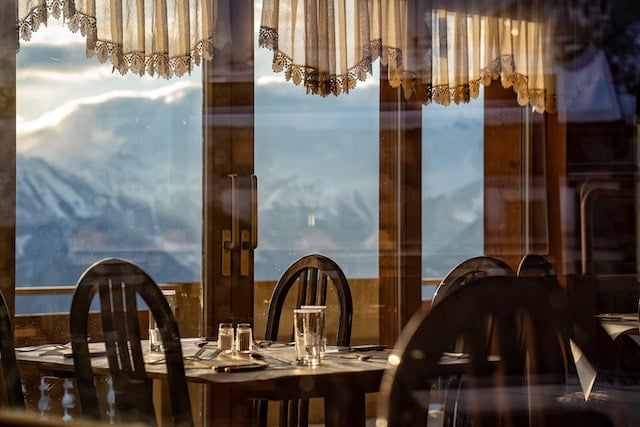Reader question: What time do the Swiss eat dinner?

With home office on the rise, many Swiss people eat their meals whenever they have time or are hungry, with some preferring snacks in between. Yet the majority still stick to ‘set’ mealtimes – but when are those?
While the Swiss are flexible when it comes to what type of bread they eat for breakfast (though they prefer so-called house bread), they usually opt for a honey or jam spread to go with it.
Lunchtimes are equally rushed, with many people grabbing a quick sandwich on the go or placing an order at a local fast food outlet, though you won’t regret finding the time for some cheesy Älplermagronen (a dish with pasta, potatoes, cream, cheese and onions) – a Swiss favourite!
Dinner is largely considered the main meal of the day throughout the country and many Swiss like to sit down for heart meal with cheese (of course!) and a glass of wine.
To give you an idea of what to expect when dining in Switzerland, here are some basic guidelines.
Dinnertime
Dinnertime in Switzerland is dictated by working hours – which range anywhere from a 6 am start to an 8 pm finish – and restaurant opening times. Generally, the Swiss wine and dine between 6 pm and 9.30 pm depending on where they have their dinner that day.
READ ALSO: What is Aromat and why are the Swiss so obsessed with it?
Dinners in the home are commonly served around 6 pm if no guests are expected. Those planning a soirée with friends and family which is often preceded by an informal dinner may choose to host just after 6pm.
If you have been invited to a party or home cooked dinner by a friend, colleague, or acquaintance, the etiquette is to bring a small gift as a thank you. In Switzerland, most people choose to bring a bottle of wine or a seasonal bouquet of flowers.
When making dinner reservations with a date or friend, the Swiss tend to book a table from 8 pm onwards. Many restaurants and pubs in Switzerland – particularly the ones in larger cities – offer hot dishes all day (from 11 am to 10 pm).
 A restaurant in Switzerland. Photo by Kinga Lopatin on Unsplash
A restaurant in Switzerland. Photo by Kinga Lopatin on Unsplash
In the evening, many restaurants will have set meals consisting of a starter, main and dessert course which will be somewhat cheaper than choosing freely from the menu.
If you fancy yourself a late-night dinner in Switzerland, remember to make a reservation and don’t panic if you forget to tip. In Switzerland, guests are not obliged to tip. Nevertheless, in many restaurants it is customary to leave a tip and you are very likely to see your Swiss friend round up to the nearest sensible figure (usually around 10 percent).
READ ALSO: You are not Swiss until you try these seven weird foods
Lunchtime
As a general rule of thumb, lunch in Switzerland is served between 12 pm and 2 pm however some restaurants cater to customers whose stomachs growl even before the clock strikes 12.
The Migros Restaurant and its rival Coop Restaurant are both popular stops for a quick lunch on a budget (open from 7.30 am) and are spread throughout Switzerland – small towns included.
You usually get the cheapest option if you order a "menu of the day" in the restaurant at lunchtime, which usually consists of a starter (soup or salad) and a main course.

The familiar orange lettering of Swiss supermarket chain Migros. Photo: FABRICE COFFRINI / AFP
While grabbing a lunch at home may still be the norm for schoolchildren – the majority of Swiss schools do not serve food – it is very much out of fashion with adults who prefer to eat on the go.
At best, the Swiss will eat at a restaurant or canteen, but they are more likely to opt for a fast-food chain, a Kebab or just buy an inexpensive sandwich at Denner.
Breakfast
Given that the Swiss working day can start as early as 6 am, breakfast is the one meal that has no set times in Switzerland but is generally eaten between the hours of 6 am and 9.30 am.

Muesli is a popular breakfast in Switzerland. Photo by Daria Nepriakhina 🇺🇦 on Unsplash
Whether for "Zmorge", "petit déjeuner" or "colazione" - in German, French or Italian-speaking Switzerland, something sweet must be part of your breakfast.
While Swiss living in the city tend to either eat less or forgo the early meal altogether, people living in the Alps like to sit down with a homemade Birchermüesli. In either case, a milk coffee for breakfast is a Swiss must.
But if you’re looking to feel really Swiss, you’ll be happy to find that sticking to set mealtimes isn’t all it’s cracked up to be – hence, why the Znüni (morning snack) and Zvieri (afternoon snack) exist.
Znüni literally translates to ‘at nine o’clock’ and is derived from the number nine since traditionally, a morning break at work is usually taken around this time. However, the term is also used when said break – usually accompanied by a Gipfeli – is made at different times, such as at 10 o’clock.
Similarly, the Zvieri (‘at four o’clock’) signifies a quick afternoon meal – usually a bag of crisps or chocolate - at any given time.
Comments
See Also
While the Swiss are flexible when it comes to what type of bread they eat for breakfast (though they prefer so-called house bread), they usually opt for a honey or jam spread to go with it.
Lunchtimes are equally rushed, with many people grabbing a quick sandwich on the go or placing an order at a local fast food outlet, though you won’t regret finding the time for some cheesy Älplermagronen (a dish with pasta, potatoes, cream, cheese and onions) – a Swiss favourite!
Dinner is largely considered the main meal of the day throughout the country and many Swiss like to sit down for heart meal with cheese (of course!) and a glass of wine.
To give you an idea of what to expect when dining in Switzerland, here are some basic guidelines.
Dinnertime
Dinnertime in Switzerland is dictated by working hours – which range anywhere from a 6 am start to an 8 pm finish – and restaurant opening times. Generally, the Swiss wine and dine between 6 pm and 9.30 pm depending on where they have their dinner that day.
READ ALSO: What is Aromat and why are the Swiss so obsessed with it?
Dinners in the home are commonly served around 6 pm if no guests are expected. Those planning a soirée with friends and family which is often preceded by an informal dinner may choose to host just after 6pm.
If you have been invited to a party or home cooked dinner by a friend, colleague, or acquaintance, the etiquette is to bring a small gift as a thank you. In Switzerland, most people choose to bring a bottle of wine or a seasonal bouquet of flowers.
When making dinner reservations with a date or friend, the Swiss tend to book a table from 8 pm onwards. Many restaurants and pubs in Switzerland – particularly the ones in larger cities – offer hot dishes all day (from 11 am to 10 pm).

In the evening, many restaurants will have set meals consisting of a starter, main and dessert course which will be somewhat cheaper than choosing freely from the menu.
If you fancy yourself a late-night dinner in Switzerland, remember to make a reservation and don’t panic if you forget to tip. In Switzerland, guests are not obliged to tip. Nevertheless, in many restaurants it is customary to leave a tip and you are very likely to see your Swiss friend round up to the nearest sensible figure (usually around 10 percent).
READ ALSO: You are not Swiss until you try these seven weird foods
Lunchtime
As a general rule of thumb, lunch in Switzerland is served between 12 pm and 2 pm however some restaurants cater to customers whose stomachs growl even before the clock strikes 12.
The Migros Restaurant and its rival Coop Restaurant are both popular stops for a quick lunch on a budget (open from 7.30 am) and are spread throughout Switzerland – small towns included.
You usually get the cheapest option if you order a "menu of the day" in the restaurant at lunchtime, which usually consists of a starter (soup or salad) and a main course.

While grabbing a lunch at home may still be the norm for schoolchildren – the majority of Swiss schools do not serve food – it is very much out of fashion with adults who prefer to eat on the go.
At best, the Swiss will eat at a restaurant or canteen, but they are more likely to opt for a fast-food chain, a Kebab or just buy an inexpensive sandwich at Denner.
Breakfast
Given that the Swiss working day can start as early as 6 am, breakfast is the one meal that has no set times in Switzerland but is generally eaten between the hours of 6 am and 9.30 am.

Whether for "Zmorge", "petit déjeuner" or "colazione" - in German, French or Italian-speaking Switzerland, something sweet must be part of your breakfast.
While Swiss living in the city tend to either eat less or forgo the early meal altogether, people living in the Alps like to sit down with a homemade Birchermüesli. In either case, a milk coffee for breakfast is a Swiss must.
But if you’re looking to feel really Swiss, you’ll be happy to find that sticking to set mealtimes isn’t all it’s cracked up to be – hence, why the Znüni (morning snack) and Zvieri (afternoon snack) exist.
Znüni literally translates to ‘at nine o’clock’ and is derived from the number nine since traditionally, a morning break at work is usually taken around this time. However, the term is also used when said break – usually accompanied by a Gipfeli – is made at different times, such as at 10 o’clock.
Similarly, the Zvieri (‘at four o’clock’) signifies a quick afternoon meal – usually a bag of crisps or chocolate - at any given time.
Join the conversation in our comments section below. Share your own views and experience and if you have a question or suggestion for our journalists then email us at [email protected].
Please keep comments civil, constructive and on topic – and make sure to read our terms of use before getting involved.
Please log in here to leave a comment.